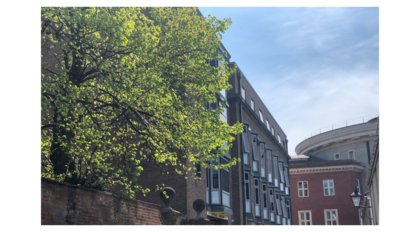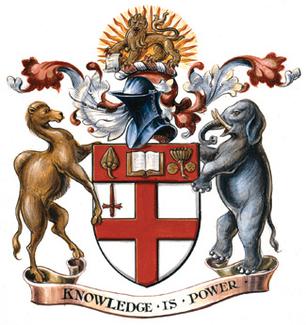
SOAS University of London is a public research university in London, England, and a member institution of the federal University of London. Founded in 1916, SOAS is located in the Bloomsbury area of central London.
Jewish studies is an academic discipline centered on the study of Jews and Judaism. Jewish studies is interdisciplinary and combines aspects of history, Middle Eastern studies, Asian studies, Oriental studies, religious studies, archeology, sociology, languages, political science, area studies, women's studies, and ethnic studies. Jewish studies as a distinct field is mainly present at colleges and universities in North America.

Middle Eastern studies is a name given to a number of academic programs associated with the study of the history, culture, politics, economies, and geography of the Middle East, an area that is generally interpreted to cover a range of nations including Egypt, Iran, Iraq, Israel, Jordan, Lebanon, Oman, Palestine, Saudi Arabia, Syria, Turkey, and Yemen. It is considered a form of area studies, taking an overtly interdisciplinary approach to the study of a region. In this sense Middle Eastern studies is a far broader and less traditional field than classical Islamic studies.
Asian studies is the term used usually in North America and Australia for what in Europe is known as Oriental studies. The field is concerned with the Asian people, their cultures, languages, history and politics. Within the Asian sphere, Asian studies combines aspects of sociology, history, cultural anthropology and many other disciplines to study political, cultural and economic phenomena in Asian traditional and contemporary societies. Asian studies form a field of post-graduate study in many universities.
The Griffith Institute is an Egyptological institution based in the Griffith Wing of the Sackler Library and is part of the Faculty of Oriental Studies, University of Oxford, England. It was founded for the advancement of Egyptology and Ancient Near Eastern Studies by the first Professor of Egyptology at the University of Oxford, Francis Llewellyn Griffith. Griffith bequeathed funds in his will for the foundation of the Institute and it opened on 21 January 1939, with its own independent committee of management. Rosalind Moss operated the Griffith Institute from its opening until the mid-1960s.

Oriental studies is the academic field that studies Near Eastern and Far Eastern societies and cultures, languages, peoples, history and archaeology. In recent years, the subject has often been turned into the newer terms of Middle Eastern studies and Asian studies. Traditional Oriental studies in Europe is today generally focused on the discipline of Islamic studies, and the study of China, especially traditional China, is often called Sinology. The study of East Asia in general, especially in the United States, is often called East Asian studies.

Iranian studies, also referred to as Iranology and Iranistics, is an interdisciplinary field dealing with the research and study of the civilization, history, literature, art and culture of Iranian peoples. It is a part of the wider field of Oriental studies.
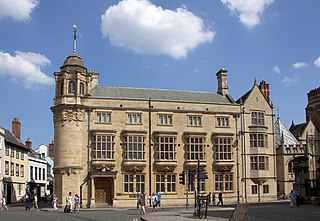
The Indian Institute was an institute within the University of Oxford. It was started by Sir Monier Monier-Williams in 1883 to provide training for the Indian Civil Service of the British Raj. The institute's building is located in central Oxford, England, at the north end of Catte Street, on the corner with Holywell Street, and facing down Broad Street from the east.

The Oxford Centre for Hebrew and Jewish Studies (OCHJS) is a recognised independent centre of the University of Oxford, England. Its research fellows teach on a variety of undergraduate and master's degrees in Oriental studies, and it publishes the Journal of Jewish Studies.
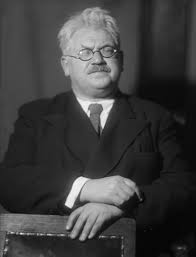
Vasily Vasilievich Struve was a Soviet orientalist from the Struve family, the founder of the Soviet scientific school of researchers on Ancient Near East history.
Armenian studies or Armenology is a field of humanities covering Armenian history, language and culture. The emergence of modern Armenian studies is associated with the foundation of the Catholic Mechitarist order in the early 18th century. Until the early 20th century, Armenian studies were largely conducted by individual scholars in the Armenian communities of the Russian Empire, Europe, Constantinople and Vagharshapat in Armenia. After the establishment of Soviet rule, Armenian studies, and sciences in general, were institutionalized in Armenia and put under direct control of the Academy of Sciences. Today, numerous research centers in many parts of the world specialize in Armenian studies.
Amy Heller is a Tibetologist and art historian.
The Faculty of Medieval and Modern Languages is a department of the University of Oxford, England. It is part of the university's Humanities Division.
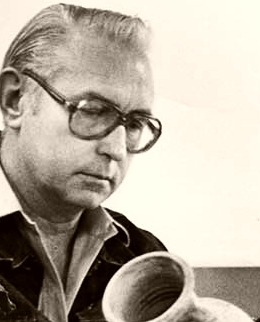
Anson Frank Rainey was professor emeritus of ancient Near Eastern cultures and Semitic linguistics at Tel Aviv University. He is known in particular for contributions to the study of the Amarna tablets, the noted administrative letters from the period of Pharaoh Akhenaten's rule during the 18th Dynasty of Egypt. He authored and edited books and articles on the cultures, languages and geography of the Biblical lands.
Ruth Barnes is an art historian in the field of South and Southeast Asian textiles. She served as textile curator of the Ashmolean Museum in Oxford before taking up her current position as Curator of Indo-Pacific Art at Yale University. She is a fellow of the Royal Asiatic Society.
The various academic faculties, departments, and institutes of the University of Oxford are organised into four divisions, each with its own Head and elected board. They are the Humanities Division; the Social Sciences Division; the Mathematical, Physical and Life Sciences Division; and the Medical Sciences Division.

Jacob M. Landau was Professor Emeritus in the Department of Political Science at the Hebrew University of Jerusalem.
Andrew S. Topsfield is Keeper of Eastern Art at the Ashmolean Museum, Oxford. He was educated at Winchester College and the universities of Oxford and London. In 1978 he joined the Indian section of the Victoria and Albert Museum as an assistant keeper and moved to the Ashmolean Museum as assistant keeper of eastern art in 1984.

Theo Maarten van Lint is a Dutch scholar of Armenian studies. He has been the Calouste Gulbenkian Professor of Armenian Studies at the University of Oxford and a professorial fellow of Pembroke College since 2002. In the past, he has also served as secretary of the International Association for Armenian Studies.
